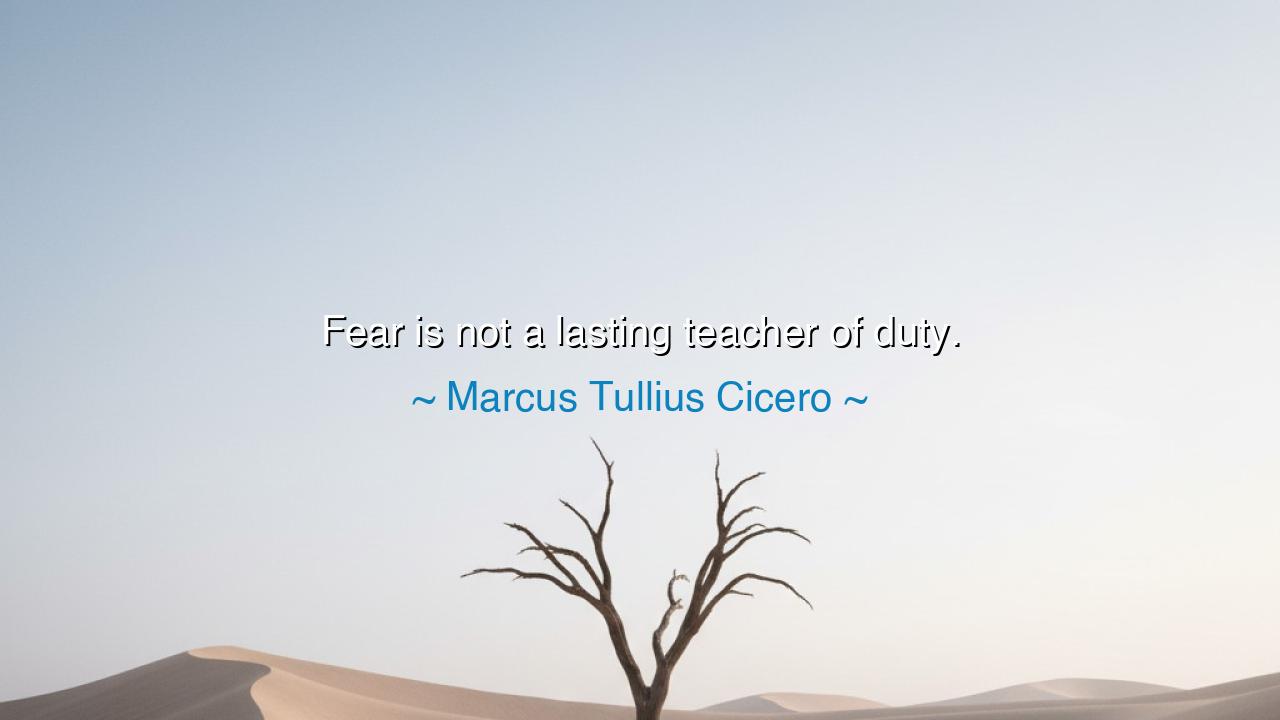
Fear is not a lasting teacher of duty.






The words of Marcus Tullius Cicero—“Fear is not a lasting teacher of duty”—are like a shaft of light cutting through the shadows of tyranny. They remind us that though fear may command obedience in the moment, it cannot shape a soul into virtue. To strike terror into men may bend their backs, but it will not bend their hearts toward goodness. True duty—the sacred bond of citizen to state, child to parent, soldier to country—must be taught not by threats but by love, by honor, and by the conviction that duty itself is noble.
The origin of this truth lies in Cicero’s age, when the Roman Republic trembled under the ambition of generals and the cruelty of tyrants. He saw firsthand that men can be made to obey the lash or the sword, but such obedience crumbles as soon as the fear is lifted. It is fragile, like frost before the sun. By contrast, duty born of inner conviction endures through hardship and even death. The Roman ideal of virtus—strength joined with honor—was not instilled by terror, but by example, teaching, and reverence for the common good. Cicero, as statesman and philosopher, declared that fear enslaves, but only virtue liberates.
History bears witness to his wisdom. Consider the reign of Joseph Stalin, who ruled by fear. Millions obeyed his every decree, trembling at the thought of secret police and labor camps. Yet the moment his grip weakened after his death, the terror dissolved, and those who lived under him spoke of his cruelty, not his nobility. Duty had not been taught—only submission, temporary and hollow. By contrast, think of George Washington, who inspired his soldiers not through terror but through example, endurance, and vision of liberty. Though ragged, hungry, and outnumbered, his men followed him, not because they feared him, but because they believed in the cause. One form of leadership bred resentment; the other, loyalty.
The emotional force of Cicero’s words lies in the recognition that duty must be willing, not coerced. A child who obeys a parent only out of fear grows bitter; a citizen who serves the state only out of fear seeks rebellion at the first chance. Fear corrodes the soul like rust upon iron, weakening the bonds it pretends to forge. But when men and women act from honor, from the inner call of conscience, then duty becomes joy, and obedience becomes freedom. This is why Cicero proclaims fear as a poor teacher: its lessons vanish, but virtue endures.
There is also something heroic in this teaching. For it demands of leaders not the easy path of domination, but the harder path of inspiration. Any tyrant can command through fear; only the true leader can inspire through love, respect, and example. Fear wins obedience for a day; love wins loyalty for a lifetime. A ruler who wishes for stability, a teacher who wishes for growth, a parent who wishes for trust—all must learn that real strength lies not in terror but in guidance.
The lesson for us is clear: do not allow fear to be your master, nor your method. If you lead others, lead with fairness, encouragement, and justice, so that their duty flows from respect, not dread. If you yourself are bound by duty, let it not be the chains of fear, but the bonds of principle. In this way, your actions will endure, even when the threats of others pass away.
What, then, shall we do? Let us seek to replace fear with trust, suspicion with honor, and coercion with inspiration. Let us remember that the strongest nations, the strongest families, and the strongest friendships are not built upon trembling obedience, but upon shared values and mutual respect. And let us live so that our sense of duty springs not from fear of punishment, but from love of truth, loyalty to one another, and reverence for what is good.
Thus Cicero’s words, spoken long ago, remain timeless: fear may command, but it cannot teach; fear may subdue, but it cannot sustain. Only virtue, only honor, only love can make duty eternal. Whoever learns this truth will walk not as a slave trembling under the lash, but as a free soul, joyfully carrying the weight of duty, unshaken by fear, and radiant in the service of what is right.






AAdministratorAdministrator
Welcome, honored guests. Please leave a comment, we will respond soon